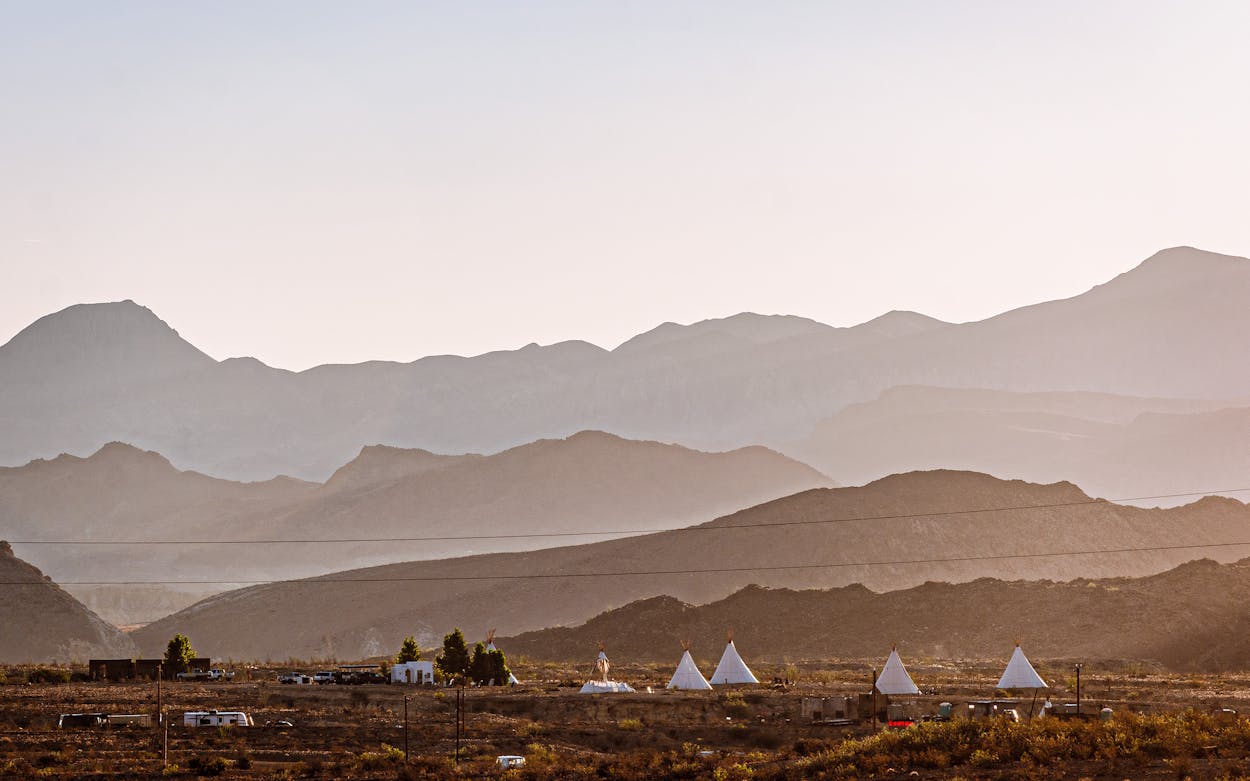In most of the world, the best way to enjoy a beautiful sunset is by directing one’s eyes to the west. But in the far West Texas town of Terlingua, as any local will tell you, the best sunset views are found to the east, where, most evenings, a soft light illuminates the Chisos Mountains, bathing the craggy, 60-million-year-old megaliths in bright pink, amber, and purple hues. For the weary desert dweller, the view offers a cinematic finale to each day and temporarily renders one of North America’s harshest environments deceptively pleasant and inviting.
For the past forty years or so, Bill Ivey, the region’s unofficial godfather, has regularly taken in this majestic panorama from his property in Terlingua’s Ghost Town, the mostly abandoned settlement he purchased and began rebuilding in the early 1980s, when Terlingua consisted of a little more than a few squatters living among the rubble of a century-old mining community and cemetery twelve miles north of the Rio Grande. For as long as Ivey has been gazing eastward, the twenty miles of rocky, jutting terrain between him and the mountain range, which rises from Big Bend National Park, has appeared largely untouched by humans—much as it has for eons of geologic time. “I still refer to us as the last frontier,” he told me. “It’s also one of the few places, and maybe the last place, where you can literally be whoever you want to be.”
But in the last few years, and particularly since the beginning of the COVID-19 pandemic, the ancient landscape has suddenly begun to transform—and the sense of iconoclastic self-determination that was woven into Terlingua’s spiritual charter is also diminishing. In the evenings, formerly unobstructed views have given way to a sea of gleaming lights in what was previously one of the darkest places on earth. Some are headlamps attached to the stream of luxury SUVs, Subarus, and Teslas from Austin, Dallas, and Houston that now crowd Brewster County’s formerly lonesome roads. But many other lights radiate from hastily erected campsites, haphazard dwellings, tepees, RV parks, yurts, bubbles, adobe casitas, and construction sites that are quickly spreading across the martian terrain. Seemingly overnight, long driveways have been carved into Terlingua’s rocky hillsides, locations that, until now, were inaccessible to anything that didn’t slither, swoop, or walk on four legs. At the tops of those hillsides, nestled among the boulders, newly constructed luxury lodges that could’ve been plucked from the Hollywood Hills, with Wi-Fi, stone bathtubs, heated pools, and electric car chargers, reign over sublime mountain vistas.
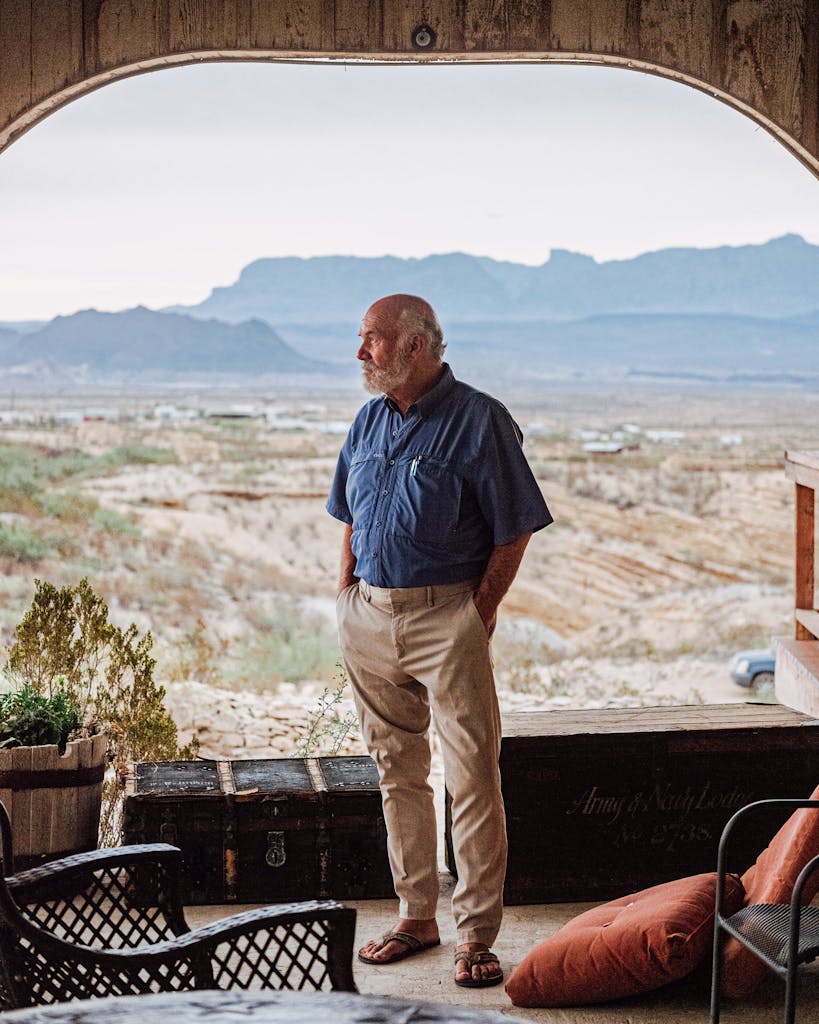
Like running water, electricity is precious in this inconvenient part of the world; indeed, some residents still live without it. It’s hard to imagine a more glaring example of outsiderism than a car charger stationed outside a Terlingua abode. But a series of flimsy-looking, A-frame structures attached to small air-conditioning units provide a worthy rival. Located on an otherwise vacant plot of land down the road from the Ghost Town, the single-room lodgings, which rent for about $130 a night, angle sharply upward, giving the impression that they have descended from the region’s star-filled sky, plopping down among the desert coral and mesquite trees like UFOs crafted from materials purchased at Home Depot. On a vast, formerly untouched plain between Terlingua’s only school and the jagged mass of rock known as Bee Mountain, construction has begun on a series of high-end, multi-room bubbles (transparent, spherical dwellings that are designed to maximize stargazing) with hot tubs, firepits, and a “guests only” eighty-foot-long swimming pool. Stockpiling that much water is so unheard of in this arid, sun-scorched death trap of a landscape that for many residents, it doesn’t register as offensive so much as unfathomable—like a Twilight Zone–esque warping of accepted reality.
No matter where you look in Terlingua, big changes are afoot, as one of Texas’s most distinctive settings begins to feel more and more like everywhere else. “It was just this past year that I looked out and I said, ‘Damn, there’s a lot of lights out there,’ and, at the same time, I could see cars driving through Big Bend National Park in the distance,” Ivey recalled. “It was like, ‘Wow, something’s going on out here!’ ”
Some of the newcomers are permanent residents. Others are buying second homes for use on weekends and holidays. Still others are tourists. Their arrival has created new business and job opportunities, but it’s also unleashed a housing crisis that has sent real-estate prices skyrocketing and driven up property taxes and rents to a level that makes it nearly impossible for some longtime residents and local service workers to remain in the community.
Like many locals, Ivey, the man largely responsible for attracting visitors to Terlingua for four decades, is growing worried. The same sense of uninhibited freedom that has always made Terlingua a special place could also, he fears, become its undoing. Ivey knows change is inevitable, but he also believes it’s time to have a community-wide conversation about how best to manage it, beyond slapping a bumper sticker on the back of one’s truck that declares “Don’t Marfa My Terlingua.”

“From an economic-development standpoint, the influx of new people is the best thing that ever happens because it brings in more money, more tax dollars, more restaurants, better medical facilities, and all of that,” said Ivey, who is president of the board of the Brewster County Tourism Council. Visitors, he noted, now pour around $80 million into the county each year. “It’s the kind of thing that any community would welcome. But at the same time, we don’t have a city council, a mayor, or a planning and zoning commission. We don’t have any way to direct the changes occurring out here, so it’s wide open—and that scares the hell out of me.”
As recently as a decade ago, the area was home to about a dozen vacation-rental properties. Today, that number has soared beyond 250, according to the tourism council. In the Ghost Town, the same rooms that local river guides used to rent for $65 a month are gobbled up by tourists for $150 a night. In 2010, the census recorded fewer than three hundred Texans living in south Brewster County, a region about the size of Delaware that is home to a handful of ghost towns and tiny settlements. Today locals estimate that that region’s winter residents, not including tourists, number more than one thousand—a population that rivals the one during the mining era’s peak years in the early twentieth century. (Given the transient nature of the population and the reported reluctance of census-takers to pester rural property owners who are often armed and suspicious of visitors, the official number remains difficult to certify.)
Terlingua’s allure has always been inseparable from the mind-bending feeling of isolation it offers—or imposes, depending on your point of view. To some, that feeling can manifest as a kind of existential dread, a sense that one has become unmoored from civilization, drifting ever deeper into an ocean of rock and sand. For those who live here year-round—among them, cave-dwelling desert rats, sun-scorched river guides, musicians, alcoholics, survivalists, artists, eccentrics, wanderers (and millionaires camouflaged as one or more of the aforementioned figures)—that sense of isolation is often experienced as a kind of primordial liberation. The feeling of being free from convenience and unshackled from expectations—of existing in “Terlingua time,” as locals put it—has always been as appealing to the flag-waving pilot of a forty-foot RV as to the tent-dwelling, peyote-smoking vagabond. But like some Daoist riddle, the more newcomers seek out Terlingua’s magic, the harder it is to find.
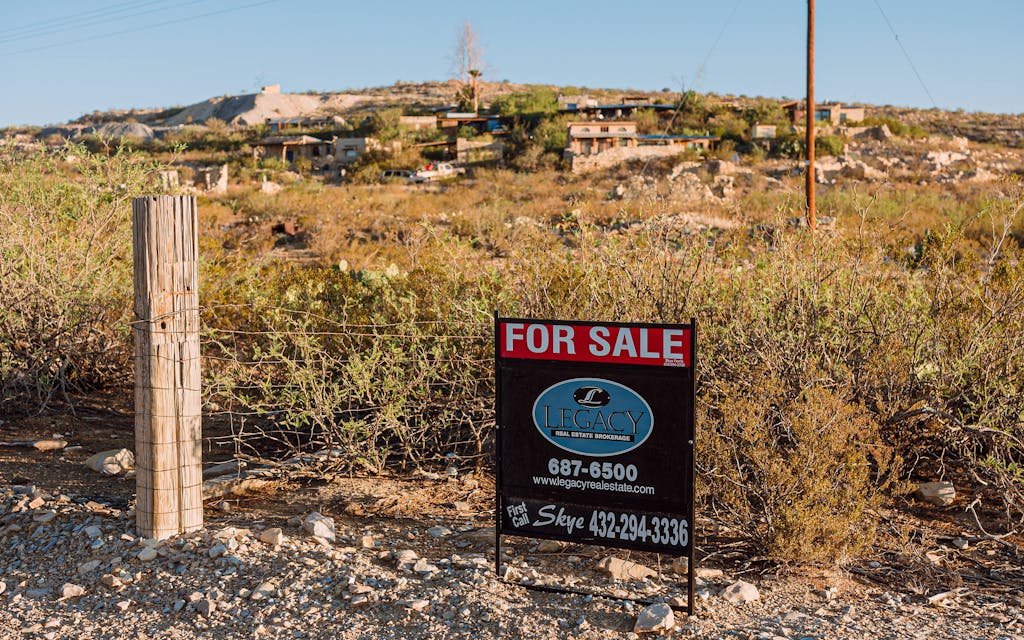
When Stephanie Jane sold her condo in Lakeway, just west of Austin, and moved to Terlingua in 2017 to escape traffic and what felt like endless waves of new housing developments, she was one of the only realtors in the area. Land was so cheap and there were so few comparable sales—sales that appraisers and home buyers rely upon to value properties—she wasn’t sure she could make a living. Today Jane, the founder of Terlingua Real Estate, lives on a sprawling ranch that is home to black bears and four-thousand-year-old arrowheads. Her family and friends wonder whether she had secret access to a crystal ball, but she says she just got lucky in her timing.
“Back then, I had no idea the world was going to go crazy,” Jane told me, referring to the pandemic and the electric blackout of February 2021. For the past year and a half, many of Jane’s clients have been following her lead, departing from Austin, Dallas, and Houston in search of a new way of life—not merely a temporary getaway. “The pandemic has pushed people out of the cities and out of their jobs, and now they’re coming here to homestead,” she said. “I think the pandemic made people think, ‘Life is short; I might as well get outside and see some of this natural beauty before I die.’ ”
Pre-pandemic, Jane said, buyers could expect to pay about $1,000 an acre for undeveloped land. Today, even for properties on the low end, she said, that price has doubled. A few years ago, an appealing twenty-acre property might fetch $6,500; today the same property is worth $40,000. Because of banks’ continued reluctance to finance purchases in such a remote area, almost all of Jane’s clients pay cash, which many obtained by refinancing their homes in the cities. In recent weeks, Jane sold Nuevo Terlingua, a six-acre property just outside the Ghost Town. It included five adobe casitas with chic outdoor showers, firepits, and collectible artwork. The price: $1.7 million.
With property taxes rising and a new generation of residents moving in, some longtime residents are parting with their properties, adding to the cultural turnover. “Especially for the old-timers, it’s not worth it anymore,” Jane said. “They’re looking out their window, and instead of seeing an empty ridge, they’re seeing a dome or an Airstream gleaming in the sunset.”
Jane has heard horror stories about naive city dwellers purchasing property on land they later discover they’re unable to access. Some newcomers are fixated on Wi-Fi access, she said, when they should be more concerned about the cost of digging a four-hundred-foot well (the only way to get water) and the challenge of finding contractors, many of whom have jobs backed up for months. “I spend a lot of time on the phone educating people about what ‘off the grid’ and being self-sustaining really means,” she said. “If you’re serious about this place, you’re gonna have to roll up your sleeves.”
Ivey and other locals maintain that the newcomers are bringing the outside world’s values with them, lured to the middle of nowhere by pure self-interest. Instead of adding value to the community, too many see an opportunity to scoop up ten, twenty, or a hundred acres to hold on to as an investment or develop into the area’s latest vacation-rental playground. For those folks, Terlingua offers rare opportunities. Brewster County has minimal residential building codes; all a new resident or developer has to do is acquire a permit for a septic tank. The region remains, in that sense, about as unfettered and lawless as it was more than a century ago, when the discovery of quicksilver (also known as mercury and used in everything from thermometers to fluorescent lighting) drew outsiders to this rugged desert hamlet. Today, it’s the land itself—devoid of water but dripping with mythology—that is fueling the latest wave of settlers, many with iPhones in hand. “We have a group of folks coming here because they want a piece of the last best thing,” Ivey said. “Maybe they’re here for an investment, or maybe it’s because it makes for good cocktail talk. Either way, it’s almost like a feeding frenzy now.” Another longtime resident, who asked not to be identified for fear of harming her own vacation-rental business, put it more bluntly. “It’s about greed and coming here to build things and make money,” she said. “They don’t really care about the culture or how they’re changing the community—a lot of them don’t even live here full time.”
When you ask longtime residents about the most glaring sign that their small community is changing, the housing crisis doesn’t always top the list. Instead, they point to a feature of city life that was unthinkable in Terlingua a few short years ago: lines. This spring, during a record-breaking tourism season that saw someone deface prehistoric petroglyphs in Big Bend, longtime residents found themselves facing a two-and-a-half-hour wait to get a dinner table at the Starlight Theatre, a onetime movie house for local miners that has, in recent decades, been converted into a popular restaurant and saloon. Owned by Ivey, the Starlight, as well as the broad porch beside the restaurant in front of the Terlingua Trading Company, has for years been the equivalent of a town square, a place where longtime residents could share a few beers, take part in spontaneous jam sessions, and trade gossip at the end of each day. The sea of unfamiliar faces from the outside world was viewed starkly, as a sort of turning point in the history of Terlingua—evidence that the urban inconveniences so many residents had devoted decades to escaping had eventually caught up with them here at the end of the Earth. Many now hold private gatherings at their homes or avoid social life altogether.
“There aren’t as many common meeting grounds around town anymore, places where people can just go and hang out and not know which one of their friends is going to show up,” said Daryl Eby, the operations manager of Big Bend Vacation Rentals, who is still considered a newcomer by some despite having lived in Terlingua for nearly two decades. “It’s sad to see it go, and it has really severely impacted a lot of our friends for whom that sense of community was a big part of their life.”
Chase Peeler, a Midland native with a PhD in ethnomusicology, moved to Terlingua in 2013 to study the community’s music culture and ended up living there for more than two years. In his 2021 book, On the Porch, he explores how common meeting grounds, specifically the porch next to the Starlight, created a singular culture of spontaneous music in Terlingua—one that is disappearing as newcomers move in. For that culture to survive, Peeler told me, communal spaces need to exist alongside the kind of affordable housing that allows artists to devote themselves to their craft. What made the porch so unique, he said, was the fluidity of the experience—the way it often lacked a clear dividing line between performer and listener, allowing anyone, even a tourist, to join in. “Most of us think of music as a form of entertainment instead of a social activity,” Peeler said. “You could go your entire life and only see music formally, on a stage. But to see the sense of wonder people felt when they visited Terlingua and experienced music as a seamless social experience was beautiful. It changed their understanding of what music can be.”
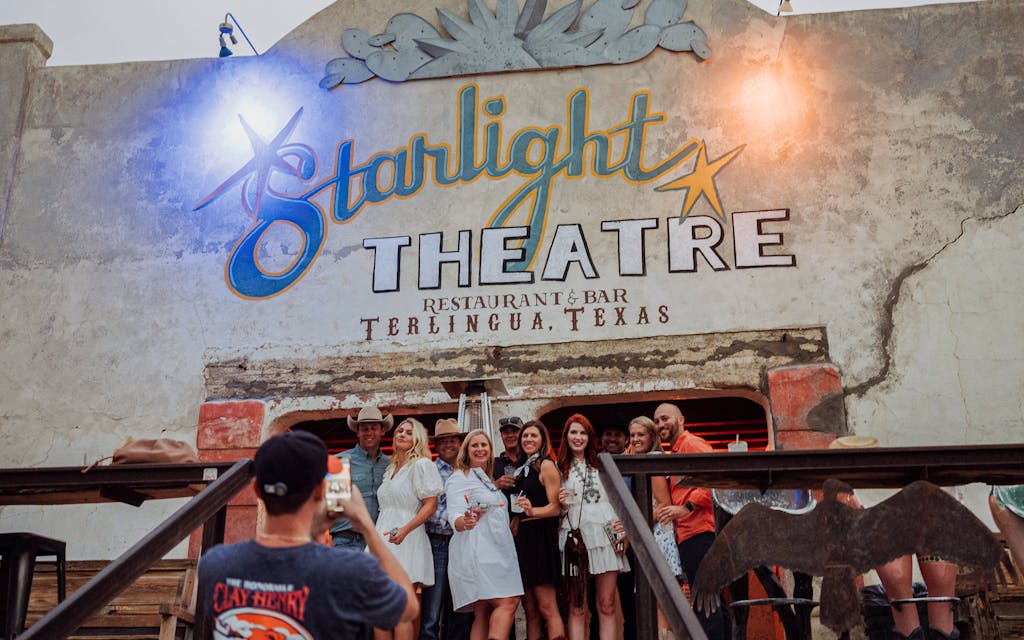
When Peeler left Terlingua in 2015, a handful of outsiders were already moving in as the first Airbnb rentals began to pop up around town and the early signs of gentrification were starting to manifest. But when he visited again earlier this year, he was shocked by what he found. “Terlingua has always taken pride in being this beautiful backwater where people live in ramshackle homes that would be illegal anywhere else in the United States—whether that’s a cave or a school bus,” he said. “Seeing some of the upscale Airbnbs felt like a clashing of worlds.”
Dani Bottenfield, owner of the Painted Feather Gallery just outside the Ghost Town, said some tourists treat Terlingua like a Western theme park, forgetting it’s a home to real-life residents. She recounted that some—after peering into the window of a home across the street from her gallery—were shocked to see a nude man there. “What do they want him to do, exactly?” she asked. “Make sure he always has clothes on inside his own home?” Bottenfield and her husband own several campers that they rent out on Airbnb, and she knows the value of the tourists who stop by her shop each day. She also knows what it feels like to be an outsider in Terlingua. Shortly after their arrival from the Laredo area sixteen years ago, she and her husband attended a community gathering on the porch by the Starlight. They asked the group of mostly longtime residents what they could do to ingratiate themselves with the tight-knit community. Bottenfield only remembers one response, bellowed at high volume for all to hear: “You can leave!”
The couple stayed, but “we knew we needed to bring something of value to the community, to give back somehow,” Bottenfield said. Her husband, a veterinarian, ended up treating animals, often at a discount, all over the county before retiring last year. And he served as head of the local water board. “The people moving here now,” she said, “don’t seem to feel like they need to invest in the community.”
On formerly untouched tracts of pristine desert land, longtime residents have been shocked to see year-round campgrounds materialize without warning, complete with weather-beaten tents, dumpsters, and bright blue portable toilets that reek of sewage. “If you’ve lived for years in a pretty remote area and all the sudden there’s thirty campers within earshot of you, it could be understandably upsetting,” said Eby. “Eyesore properties,” in his words—particularly those that don’t provide visitors with showers or restrooms, instructing campers to instead bring their portable loos—are ripe for tension. Inevitably, at some campsites, visitors fail to bring their own toilets and have been witnessed wandering onto private land to relieve themselves, leading to some locals showing up to yell and honk at bewildered campers.
“I remember an instance a year ago,” Eby said, “where some local had come to a property and started warning the guests in almost a threatening tone about local crime issues involving illegal immigrants, and the way he came at it wasn’t like he was concerned for their safety. It sounded like the individual was just trying to strike fear into these people. No matter the situation, that’s completely unfair for the campers.”
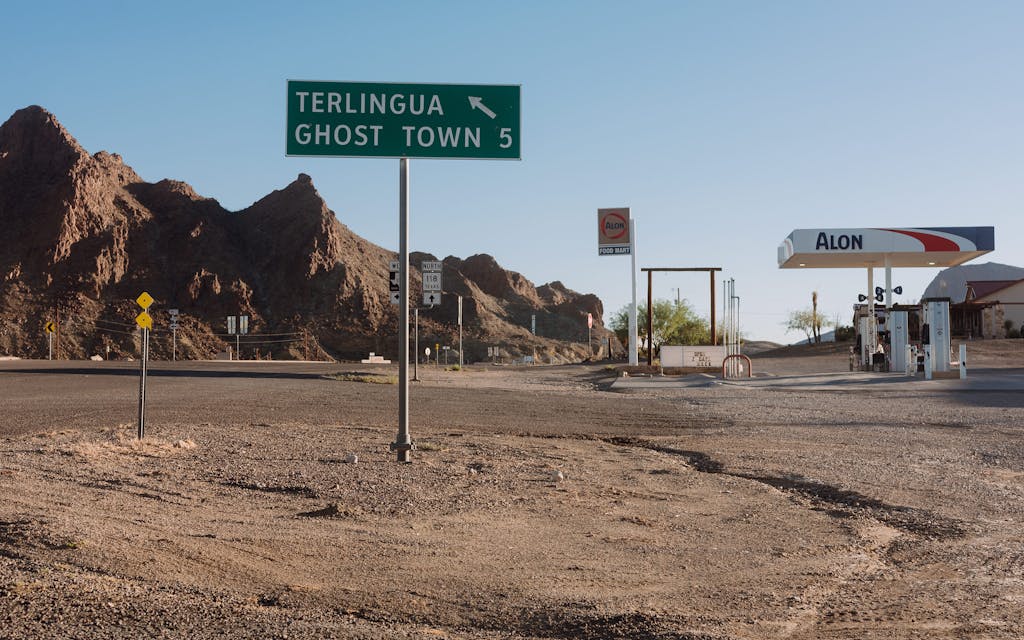
Growing up in the Terlingua area, Cory Maxwell spent his youth on both sides of the border. At thirteen, he was living with his family on a ranch in Mexico. Each morning, he’d cross the Rio Grande and, without a license, drive himself to school, passing a local law enforcement officer who eventually grew resigned to seeing the middle school student behind the wheel of his truck. Maxwell spent his teenage years exploring the area on horseback, hiking throughout the region, riding all-terrain vehicles up area mountains, and attending drunken bashes and quinceañeras on both sides of the border. Back then, the land was so cheap and the community so small that nobody really cared what he and his friends were up to, even on private property. “It was like living in the Wild West,” he said.
When I met with Maxwell on the porch outside the Starlight Theatre on a scorching evening in May, the tall, soft-spoken 36-year-old had taken a seat on a wooden bench and had a beer in his hand. With daily temperatures nearing 110 degrees and the Rio Grande dried up in many places, tourists had begun to trickle out of the region. Some of Terlingua’s longtime residents had started to emerge from hiding, meeting on the porch to commiserate over clinking bottles and cigarette smoke as the sun set in the distance and the Chisos Mountains faded from pink to black.
There was a deep familiarity here, the kind that comes from having helped one another dig holes for septic tanks in triple-digit heat, or from having traded stories over drinks more times than one can remember. For as long as people have gathered on this porch, in this place, some variation of that feeling has endured. But there is also the sense, even amid the laughter of another prototypical Terlingua evening, that the bubble that seems to have suspended time itself, keeping the rest of the world at arm’s length, is beginning to crack. Some, like a small, older woman who declined to give her name but said she had lived in Terlingua since 1970, remain more than happy to let outsiders know how they feel about their arrival. “Where the hell do you come from, peckerwood?” she demanded to know after approaching me from behind and poking her index finger into my back. “Get the hell outta here! You and your stupid shoes!” (Admittedly, I was wearing a ghastly pair of yellow Crocs.)
Others, like Maxwell, have a more nuanced view of Terlingua’s recent growth. After high school, he couldn’t find a job that would support a family in the area, so he bounced around the country, working in the restaurant industry in Atlanta; construction in Asheville, North Carolina; and as a horseback guide in Taos, New Mexico. Today Maxwell is back in Terlingua, living comfortably, raising two kids. Like many locals, he works at multiple jobs, all bolstered by the tourist economy: maintenance work for a local ranch that rents out rooms to visitors, construction jobs, and waiting tables and bartending at the Starlight. He hopes to buy some property on which he can build his own vacation rental. None of it, he freely admits, would be possible without the inflow of big-spending outsiders. If they left, Maxwell and his family would likely be forced to follow.
Still, there are trade-offs. One morning during the pandemic, Maxwell decided to take his kids hiking on a little-known, backcountry trail that he has enjoyed for decades, just outside Big Bench Ranch State Park—a path where ancient arrowheads and rock paintings hide among narrow crevices and otherworldly rock formations. As he and his children made their way along the trail, they were surprised to encounter a woman, maybe sixty years old, straddling an ATV and aggressively yelling at them to “get off the property!” As Maxwell took a step in the stranger’s direction, her hand moved to a pistol strapped to her waist. “I was unarmed,” he said, “but it was like she was ready to have an Old West shoot-out there in the desert, right in front of my kids.”
Maxwell approached cautiously and reached out his hand in hopes of making a proper introduction. It worked. He explained he was a longtime resident who loved the trail and had been hiking it for decades. He told her about the history of the area and explained its cultural significance, to which the woman seemed oblivious. She told him she didn’t own the land but was a newly arrived neighbor patrolling it for the owner, who was away. No longer clutching her firearm, she told Maxwell he could return to hike in the future so long as he secured permission first. The two parted ways on polite terms, but Maxwell was taken aback by the encounter, and he continued to ponder the incident in the months that followed. “At the core of it was this aggressive ‘This is my land!’ kind of a mentality,” he said, shaking his head and taking another swig of his beer. Had he taken her up on her demand that he get permission before returning? “I haven’t been back since.”
I asked Maxwell what it felt like to lose access to a cherished piece of the borderless land that had shaped his confidence and connected him so deeply to the ancient terrain. While acknowledging his sadness, he added that on some level, he sympathized with the ATV rider. “People pay a lot of money for this land,” he said. “Before, it was so ridiculously cheap it was like, ‘Yeah, you want to go find a place to run your ATV up that mountain, sure, go for it!’ The land was worthless back then”—at least in monetary terms.
“But now,” he said, “I guess everybody wants a piece of it.”
- More About:
- Politics & Policy
- Terlingua
